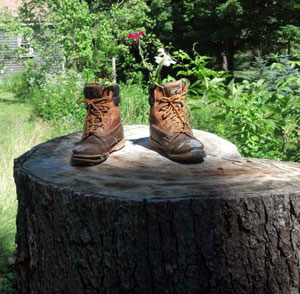Such a confusingly funny sentence, right?
My husband, Kevin, heard this in Woonsocket, RI – the northernmost Rhode Island city once known for its population of French Canadian immigrants. (It’s the headquarters of the American-French Genealogical Society.)
The syntax reflects a language preconditioning.
I say ‘preconditioning’ because – at the moment – I can’t think of a better word. As newborns we swim to the surface of consciousness and learn our native tongue. (Writing ‘native’ seems archaic – perhaps innate would be better.)
Syntax: ‘the arrangement of words and phrases to create well-formed sentences in a language’. How important is it to communicate clearly? Did I say this clearly enough? My mind hovers with indecision. Syntax calls to me today.
I understand the meaning of this sentence – about shoes and stairs. I know that the speaker didn’t toss him/herself down the staircase where a pair of hapless shoes waited. The speaker’s mind knows the event and translates it into a sentence built with home-bred language structure.
Oh, words! How quickly (or slowly) do they manifest meaning to our minds. And how almost instantaneously do they translate meaning into speech. The time needed to hop from these inklings of thought into speech thus validates the use (or over use) of these universal sounds: um… oh!… ah!
Here is Wikipedia’s definition: ‘In linguistics, a word of a spoken language can be defined as the smallest sequence of phonemes that can be uttered…’ and: ‘a phoneme is a unit of sound that can distinguish one word from another in a particular language.’
Units of sound! I stub my mind on this entire cobweb of terms.
But, let’s listen to wicked Wiki’s discussion of word: ‘There still remains no consensus among linguists about the proper definition of “word” in a spoken language that is independent of its writing system, nor about the precise distinction between it and “morpheme”‘ – Oh, learned linguists, why no consensus? And would I even understand your consensus?
And independent of its writing system – to visually represent verbal communication? I’m sitting before my third grade teacher’s chalkboard, learning whatever she’s teaching the class. Miss Hollingsworth spoke softly, terrified our ears, and was never disobeyed. Unlike words which could be disobeyed, the voice sending the words was not.
Here is the word-numbing definition, then, of ‘morpheme’ (you knew I had to follow this rabbit trail): ‘A morpheme is the smallest meaningful lexical item in a language. A morpheme is not necessarily the same as a word. The main difference between a morpheme and a word is that a morpheme sometimes does not stand alone, but a word, by definition, always stands alone.’ – A lexical item, how quaint. A word, in other words…
I particularly enjoy knowing that a morpheme is the ‘smallest meaningful lexical item’. Dare I suggest that every smidgen of anything is meaningful? Because, it is. Isn’t it?
And thus I end my discussion of throwing shoes.
* * *
Above photo was taken by me a number of years ago in the Arnold Mills area of Cumberland, RI. The tree trunk is near Craig S. Johnson’s home on Arnold Mills Road. Craig calls himself the Cranky Yankee and has written about the area for Cumberland’s local paper, The Valley Breeze. Craig often placed items on this tree trunk for passers-by could take – or leave. I seem to remember that the tree was historically old before it was cut down.
Further research – The tree trunk is actually in front of Arnold Mills Schoolhouse: A mid-nineteenth century one-story, end-gable, frame structure, which originally had two doors at the street end. It is next to the North Cumberland Firehouse. – Arnold Mills was founded in 1724 with the establishment of a sawmill by 4 owners. The mill and land was sold in 1745 to Amos Arnold.
Here is a link to Craig’s Valley Breeze article from 11/20/2013: Fifty Years Ago – Some celebrated, some lamented opening of Nate Whipple Highway

Funny how language migrates from place to place, picking up nuances and keeping traits from the previous.